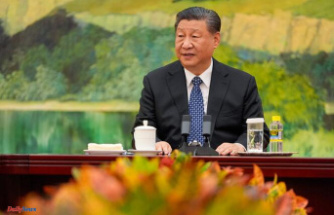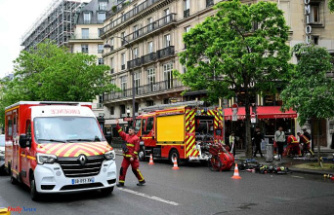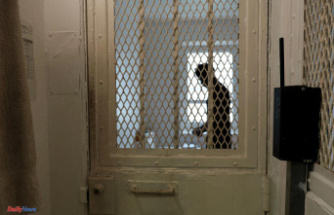They bring the food to the table and clear the dishes: robots are still rare in restaurants in Germany. But because there is a shortage of staff in the catering industry, their use could increase significantly. Does that suit the taste of the guests?
The little guy is only 1.30 meters tall, but he can carry a lot of trays at the same time, rush through the restaurant at a brisk pace and work non-stop. In a sushi restaurant in Cologne, the robot named Miaomiao is part of the service staff and drives to the tables autonomously. The guests take the food they have ordered from one of the four floors, i.e. from the robot’s body. The machine - its display in the "head" is reminiscent of a cat - dutifully says "thank you" and moves to the next table with soft music. There is a shortage of staff in the catering trade - a growing opportunity for service robots as a kind of assistant waiter, some say.
The robot relieves its staff, reports the co-owner of the sushi restaurant "Nakoyashi", Jianming Wu. "He is only a supplement, not a replacement." On the display, he types in which table Miaomiao should dash to with the freshly charged battery. A sensor system prevents bumping, room coordinates are stored, as well as a voice output - so the service machine can also sing "Happy Birthday". "Our robot supports us a lot. It also makes a bit of a show and is of course an attraction."
The use of such robots is not yet widespread in Germany, says economics professor Valentin Weislämle from the Baden-Württemberg Cooperative State University. "However, it is clear that the number of devices is increasing and that the service robots will not disappear. In this respect, one can speak of a trend." The lack of staff in the industry is an accelerator for their spread, explains the head of the business administration tourism, hotel and gastronomy course. "The decisive factor is always the cost."
The service robots for commercial use cost at least around 10,000 euros and, depending on the digital possibilities, much more. They can be used for this without a break. "This development will definitely be unstoppable," believes Weislämle. The machines could act as transport devices for crockery, take orders with speech recognition and deliver the food to the exact place. The robot could also replace a service worker, says the scientist.
So far, the Dehoga restaurant association only knows of a few companies that work with service robots - for example in the Allgäu, in Bayreuth, in a port restaurant in Schleswig-Holstein or even a hotel in Berlin. Managing Director Ingrid Hartges emphasizes: "We cannot confirm that companies are increasingly investing in service robots due to staff shortages." Robots relieve the load on the delivery and removal of dishes or simple meals, but cannot replace real employees.
"We do not assume that service robots will be purchased across the board in our industry to replace employees, although they naturally arouse great enthusiasm among the guests," says Hartgies. Human contact and "warm and competent hospitality" are indispensable.
In the restaurant "Höxter Am Jakobsweg" in Ostwestfalen-Lippe, everyone is enthusiastic about the assistant, called Bella there. "The robot far exceeds our expectations," says operator Rainer Bruns. "Likeable charisma, appealing design and the pleasant voice of the robot" swept away all reservations among guests and employees. The device has been working reliably, without software crashes and with "considerable added value for our employees" for a good five months now.
Bella jumps in when transporting plates, can carry ten kilograms each on four large trays between the kitchen and the restaurant. The robot takes some or even all of the unpopular and strenuous work away from the service staff. Bella cannot serve - and Bruns thinks that should remain in human hands. In his restaurant, the robot brings the food to the table, but the waiter serves it. A "win-win situation," says the restaurant manager. "We are convinced that Bella will revolutionize the waiter's job and make it even more attractive."
At "Balkes Morhoff" in Petershagen near Minden, the robot is called Layla and helps especially with large groups. The machine is a great relief, it says. "We have more time for the guests." However, not all visitors are pleased. Although robots have been in use in many industries for a long time, some guests in the catering industry were skeptical. In the Cologne sushi restaurant "Nakoyashi", the visitors are amused: "A good gag and crowd puller", comments Robert Suche. "He's never brought anything wrong to our table either." His wife Marion Sellmann says: "I think that's funny. However, we don't come because of the robot, the food has to taste good."












